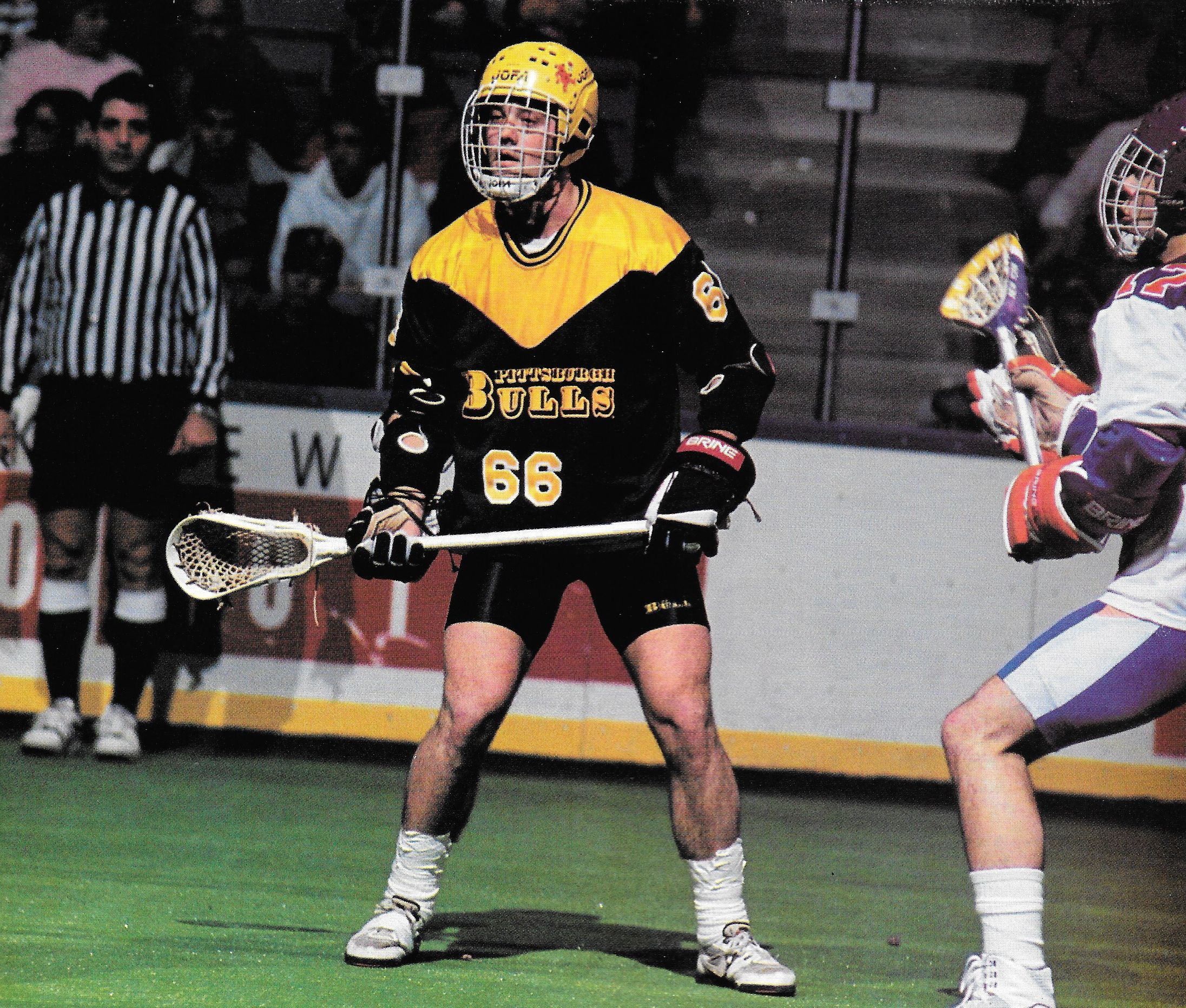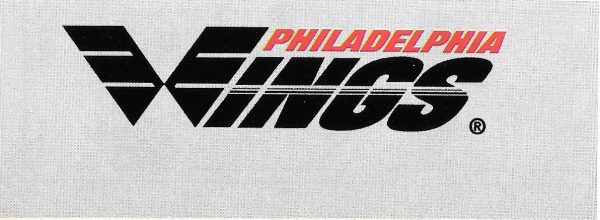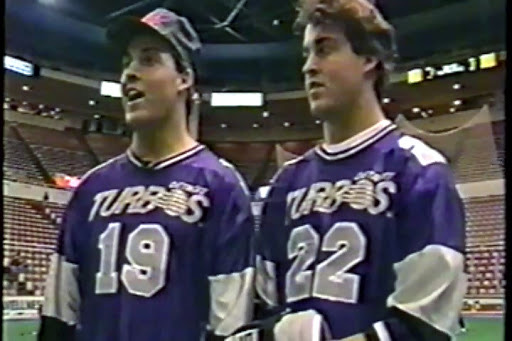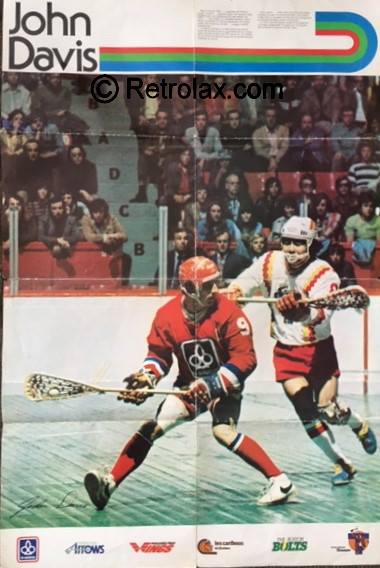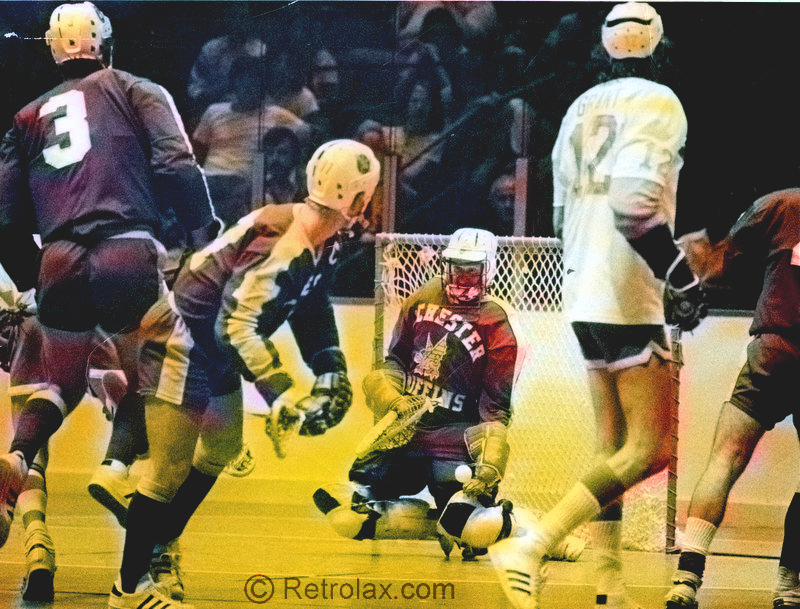By Robert Seltzer, Inquirer Staff Writer
As a member of the Philadelphia Wings, the new professional box lacrosse team, Mike French is “going back in time.”
There is only one problem.
French is visiting the past with a body from the present, a 33-year-old body from the present.
And that means his itinerary includes unscheduled stops to the trainer for treatment of aches and pains and bruises.
No matter – the exhilaration of the trip, he believes, is worth the hurt he experiences along the way.
“Our first game was very physical,” French recalled. “I felt stiff, uncomfortable. If you’re not comfortable, the normal things like catching the ball don’t come easy. The first time I got knocked down, it shook me out of it.
“Getting knocked down wasn’t fun, but it got my juices going. I didn’t bounce up as quickly as I might have liked. But everyone will say that you have to get whacked now and then. Besides, I did want to go back in time.”
French was a three-time all-America lacrosse player at Cornell. The Wings planned to draft him in the third round in 1976, but it never happened. The National Lacrosse League folded that year, after only two seasons, and French was left with a dream he could not fulfill.
“I was disappointed, very disappointed,” he said. “I went on to do other things I wanted to do, so I was covered. The initial disappointment didn’t last long. But I knew Philadelphia was a great lacrosse town, and I really wanted to play here.”
Well, French is playing here, and only 11 years after he thought he would. He is playing here thanks to two guys with dreams of their own, Chris Fritz and Russ Cline, both of Kansas City, Mo. After studying and restudying other professional sports leagues, both successful (read NFL) and unsuccessful (read USFL), the two men launched the Eagle League Pro-Box Lacrosse in January, with Fritz as president and Cline as vice president.
“Oh, this makes me feel younger,” said French, a consultant for hotels, restaurants and amusement parks in the area. “I knew from the get-go that I would not make any money playing on this team. I just enjoy playing the game. I don’t mind the bumps and bruises one bit.
“I’m very satisfied in knowing that I can still play,” French said.
The Eagle League is starting modestly, with a six-game regular season for each of its four teams, and Fritz and Cline think it will survive because of players like French – players who do not equate success with mega-buck salaries, incentive clauses or Nike contracts. French earns $100 per game. He uses the money to buy his teammates six-packs of beer after the games.
“Somewhere down the road, we might make some good money,” said Dave Huntley, 30, coach and general manager of the Wings (1-2), who will play the Washington Wave (1-2) at 8 tonight at the Spectrum. “But not right now. If we’re in it for the money, we should be committed to an insane asylum. But I think everyone feels that we are on the ground floor of something that could turn out big.”
Away from the arena, the Wings are bankers, opticians, stockbrokers, management counselors. They do not need the puny salary they get as members of the team. What they have grown to enjoy, if not need, is the camaraderie, the excitement, the sense of satisfaction that comes from being a box lacrosse player.
“When Dave Huntley called and asked if I wanted to play, I jumped at the chance,” said Dave Tasker, 36, an optician in Wilmington. “I’m doing it to play a sport I’ve always loved playing. I’m from Canada, and over there, lacrosse is what baseball is here.”
Of the 20 players on the team, 13 live in Baltimore. Which means that, while home games are played at the Spectrum, practices are held in Baltimore. Which means, further, that the Philadelphia-based players have to drive to Baltimore once a week for practice sessions.
“The players are good people, with good character,” said Huntley, a three-time all-American at Johns Hopkins. “I knew most of the guys before the league was formed. There were maybe two guys I didn’t know. I don’t have to nursemaid them. It’s my job to make sure they attend practices and are able to get transportation to the game, but I don’t have to keep after them. They’re reliable.”
Although the league began operating this year, the idea was born in January 1985, when Fritz and Cline launched a box lacrosse exhibition series between two “all-star” teams they had assembled – “Team USA” and “Team Canada.” The matches were held in Philadelphia, Baltimore, Rochester, N.Y., Norfolk, Va., and Washington. These cities became the test markets for the league that followed.
“The exhibition games told us there was big interest in box lacrosse,” said Cline, who spent 10 years doing marketing and promotional work for the Kansas City Chiefs. “We were excited.”
The two businessmen poured approximately $500,000 into the exhibition series, losing $40,000 of it. They will lose some more money with the newly created league. They know that, and they do not care.
“I’d rather not say exactly how much money we’ve put into this, but it’s in the hundreds and hundreds of thousands,” Cline said. “We knew at the outset that we would lose something. We just don’t know how much it will be. All we’re really doing this year is building the market. We don’t want to overextend ourselves.”
Fritz and Cline own all the teams in the league – the Wings, the Wave, the New Jersey Saints and the Baltimore Thunder. They acknowledge that the situation creates the potential for a conflict of interest. What, for example, is to prevent them from favoring one franchise and letting the others remain grounded in mediocrity?
They considered that possibility, and they developed a two-pronged system to avoid it. First, the players were selected through an internal draft, with all four coaches meeting to reach agreement on the athletes they would pick. And, second, every player in the league makes the same amount of money, $100 plus expenses, which removes the threat of a “star system” developing.
“The league will own the teams so that we can control our own destiny,” Cline explained. “We don’t want to bring in a bunch of owners who just want to make money at the expense of survival. . . .
“We learned a lot from the mistakes of the old National Lacrosse League,” Cline said. “We’re trying to move along slowly. They literally tried to become a major league immediately. They sold franchises. They paid salaries that averaged $18,000 to $20,000 a year. They would lose a franchise, add one, lose one, add one. Then, finally, they folded.”
The name Wings was selected so that Philadelphia fans could identify with the franchise that went under – an identification that is made easier because John Grant, who played on the old team, has returned.
“This is great,” Grant, who lives in Peterborough, Ontario, said recently. “When I played here in the 1970s, the Flyers won two championships, and the fans carried them to the title. Philadelphia fans are tremendous.”
Yet, for all his marquee value, Grant, 35, receives the same $100 per game that the other players do.
“I would love to see astronomical salaries one day,” Cline said. “But that wouldn’t be smart right now, and the players have accepted that. They’re in it because they love the game.”
OK, so Cline and Fritz have done their homework. But why box lacrosse, a game that differs from field lacrosse in that it is played indoors and uses six players instead of 10? Why a game that many ardent sports fans have never seen?
“A friend of ours suggested box lacrosse, and that’s how it started – just an offhand remark, really,” Cline explained. “Chris has always been very astute. We’re good friends. We’re partners in four other companies, and when he got interested in this, well, I had a feeling it would work.”
It does seem to be working, at least in Philadelphia. The Wings attracted a crowd of 14,189 for their first home game, against the Saints, on Jan. 31. Of those fans, approximately 800 were season ticket-holders.
“This season is basically a learning experience,” Cline said. “It’s not a destination, it’s a journey.But we’ve been very pleased with the response in Philadelphia.”
Cline said the league would expand – but slowly.
“We are not going to expand the league next year,” he said. “If we do not overextend ourselves financially, if we do not bring in a weak franchise that drains our money, if we can get this on a solid footing, then we can expand. Right now, our goal is to make it work in the four cities – and give the players a small raise next year.”
French, like the league executives, is taking it one year at a time.
“My brother Paul kind of laughed when I told him I was going to play,” French said. “After all, I hadn’t played box lacrosse in 15 years. But I started running and lifting weights, and I’m very pleased that I’ve been able to help my teammates.
“My initial reaction was that I would just play this year. Now, I think I would like to play in the upcoming season. I’m just going to measure how this season turns out and how well I feel.”
Whatever he decides, he has the satisfaction of knowing that his brother Paul, who also plays on the team, has stopped laughing.
“He was a great player in the past,” said Paul, 26. “But he was a little overweight, and he hadn’t played in so long. I think he was expecting to help out more with leadership than with ability. But he’s been playing real well, real smart.”
(Philadelphia Inquirer, February 14, 1987)

